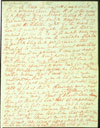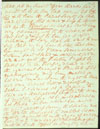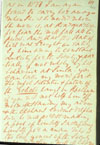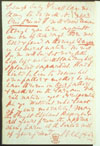Mahatma Letter No. 89: Difference between revisions
No edit summary |
No edit summary |
||
| Line 165: | Line 165: | ||
[[Category:ML with images]] | [[Category:ML with images]] | ||
[[Category:ML needs commentary]] | [[Category:ML needs commentary]] | ||
[[es:CM89]] | |||
Latest revision as of 13:36, 11 December 2024
| Quick Facts | |
|---|---|
| People involved | |
| Written by: | Morya |
| Received by: | A. P. Sinnett |
| Sent via: | unknown |
| Dates | |
| Written on: | unknown |
| Received on: | September 1882 |
| Other dates: | unknown |
| Places | |
| Sent from: | unknown |
| Received at: | Simla, India |
| Via: | unknown |
This is Letter No. 89 in The Mahatma Letters to A. P. Sinnett, 4th chronological edition. It corresponds to Letter No. 46 in Barker numbering. See below for Context and background.
< Prev letter chrono
Next letter chrono >
< Prev letter Barker
Next letter Barker >
Page 1 transcription, image, and notes
|
Received Simla, 1882. I will thank you, my dear Sinnett Sahib, for a personal favour. Since K.H. is too much of a perfect Yogi-Arhat, to stop the hand that undaunted by failure keeps on trying to catch the Tibetan yak by the neck to bend it under its yoke, then all that remains for me to do is to make once more my appearance on the nataka-shala to put a stop to a performance that threatens to become monotonous even to us — well trained in patience. I cannot avail myself of your kind advice to write to Mr. Hume in my brightest red since it would be opening a new door for an endless correspondence, an honour I would rather decline. But I write to you instead, and send you a telegram and answer on back on't, for your perusal. What talk of his is this? Reverence may not be in his nature, nor does any one claim or care for it any way! But I should have thought that his head, that is capacious enough to hold anything, had a corner in it for some common sense. And that sense might have told him that either we are what we claim, or we are not. That in the former case, however exaggerated the claims made on behalf of our powers still if our |
NOTES:
|
Page 2
|
knowledge and foresight do not transcend his, then we are no better than shams and impostors and the quicker he parts company with us — the better for him. But if we are in any degree what we claim to be, then he acts like a wild ass. Let him remember, that we are not Indian Rajahs in need of and compelled to accept political Ayahs, and nurses to lead us on by the string. That the Society was founded, went on and will go on with or without him let him suit himself as to the latter. So far his help, that he thrusts on us, much after the fashion of Spanish mendicant hidalgos, who offer their sword to protect the traveller with one hand and clutch him by the throat with the other, has not — as far as I can find very beneficial to the Society so far. Not to one of its founders, at any rate, whom he has nigh killed last year at Simla and whom he now harasses, sticking to her like grim death turning her blood into water and eating her liver out. Therefore I expect you to impress upon his mind |
NOTES:
|
Page 3
|
that all we should "give thanks for," would be to see him take care of his Eclectic and to leave the Parent Society to take care of itself. His advice and help to the editor of the Theosophist has no doubt been very advantageous to the editor, and she does feel grateful to him for it after deducting the large share she owes to yourself. But we beg leave to state, that some line ought to be drawn somewheres — between said editor and ourselves; for we are not quite the Tibetan triplets he takes us to be. Therefore, whether we be the ignorant savages and Orientals of his making — every wolf being master in his own den — we claim the right to know our own business best, and respectfully decline his services as a captain to steer our Theosophical ship even on "the ocean of worldly life" as he metaphorizes in his sloka. We have allowed him, under the good pretext of saving the situation with the British theosophists to ventilate his animosity against us in the organ of our own Society and to draw our portrait-likenesses, with a brush dipped in haughty bile — |
NOTES:
|
Page 4
|
what more does he want? As I ordered the old woman to telegraph him back — he is not the only skilful navigator in the world; he seeks to avoid Western breakers, and we to steer our canoe clear off Eastern sandbanks. Does he mean in addition to this to dictate from the Chohan down to Jwala Khool and Deb what we shall and what we shall not do? Ram, Ram and the holy Nagas! is it after centuries of independent existence that we have to fall under a foreign influence, to become the puppets of a Simla Nawab? Are we school boys, or what, in his fancy to submit to the rod of a Peling schoolmaster. . . . Notwithstanding his sulks I beg you will tell him that you heard from me — and that I have asked you to let him know my ultimatum: if he would not break with the whole shop altogether, and for ever I will not suffer him to interfere with his wisdom between our ignorance and the Parent Society. Nor shall he ease his bad humour on one who is not responsible for anything we may do or say — a woman so sick that |
|
NOTES:
|
Page 5
|
as in 1877 I am again forced to carry her away — when she is so needed where she now is, at Headquarters — for fear she will fall all to pieces. And that this state of hers was brought on lately by him owing to constant anxiety for the Society, and partially if not wholly by his behaviour at Simla — you can take my word for it. The whole situation and future of the Eclectic hangs on Koothumi if you will not help him. If notwithstanding my advice and the Chohan's evident displeasure he will persist making a fool of himself sacrificing himself for a man who is the evil genius of the Society in one direction — well it's his own |
|
NOTES: |
Page 6
|
business, only I will have nothing to do with it. Your true friend I will ever remain though you turn against me one of these days. Fern was tested and found a thorough Dugpa in his moral nature. We will see, we will see; but very little hope left notwithstanding his splendid capacities. Had I hinted to him to deceive his own father and mother he would have thrown in their fathers and mothers in the bargain. Vile, vile nature — yet irresponsible. Oh ye Westerns, who boast of your morality! May the bright Chohans keep you and all yours from the approaching harm is the sincere wish of your friend |
|
NOTES: |
Context and background
Physical description of letter
The original is in the British Library, Folio 2. According to George Linton and Virginia Hanson, the letter was written:
On both sides of two sheets of heavy paper, in M script in heavy lettering and in bright red ink. Rather blotched appearance.[1]
Publication history
Commentary about this letter
Notes
- ↑ George E. Linton and Virginia Hanson, eds., Readers Guide to The Mahatma Letters to A. P. Sinnett (Adyar, Chennai, India: Theosophical Publishing House, 1972), 148.





